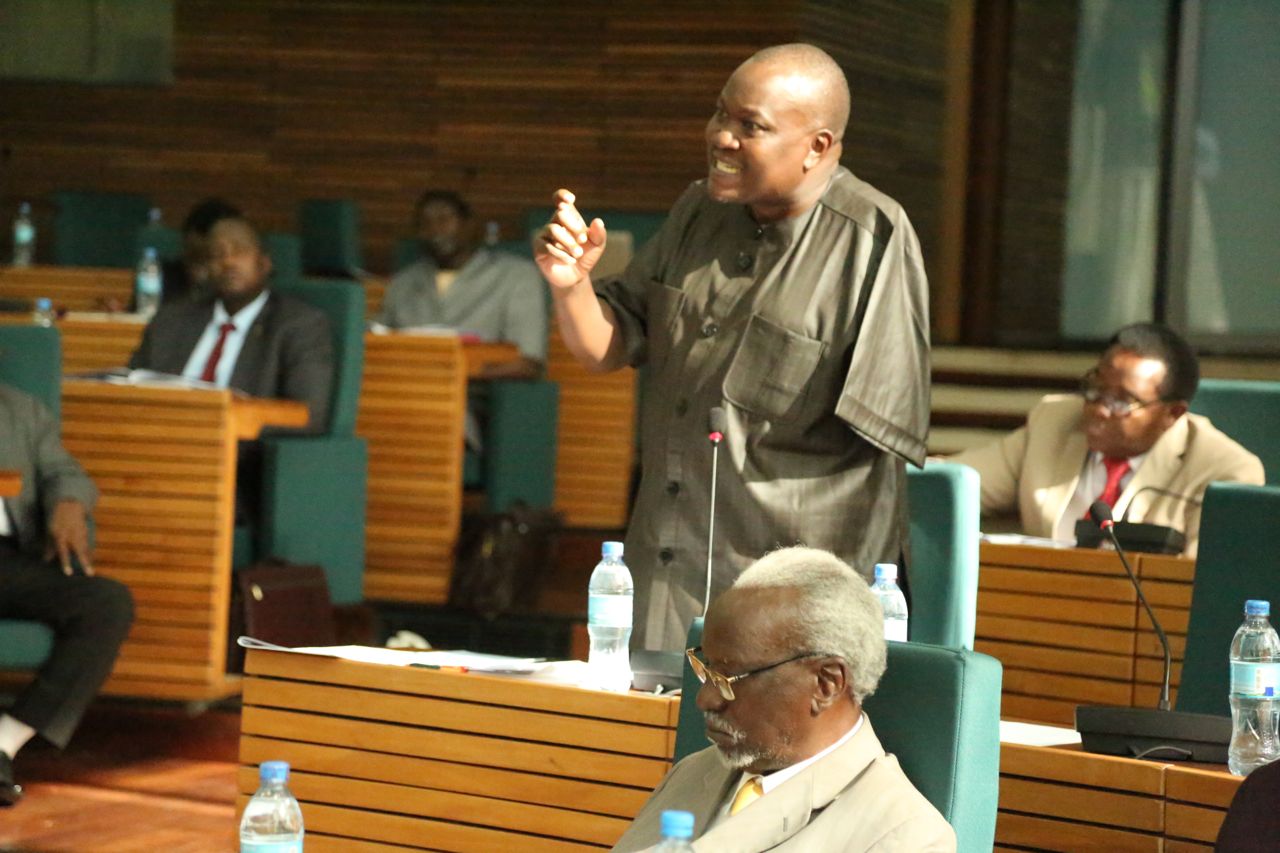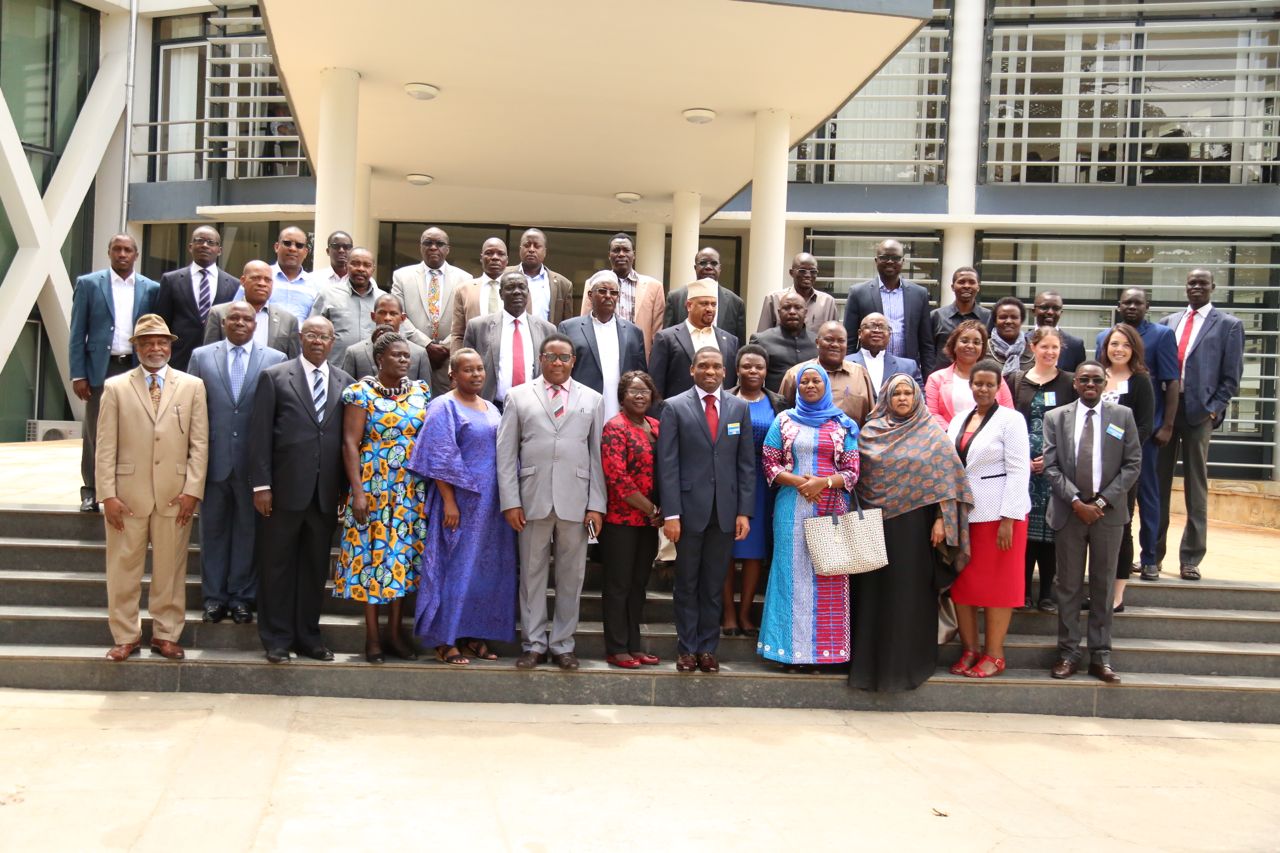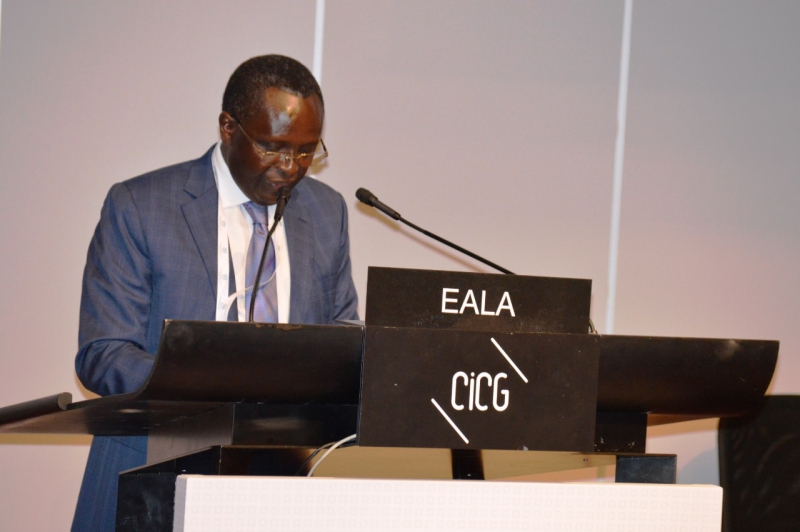
Posted in Press Release
East African Legislative Assembly, Arusha, Tanzania: 6thOctober, 2018: EALA is adding its voice to the debate on greening the environment. The regional Assembly now wants Partner States to make tree seedlings available to various communities to embark on massive tree planting campaigns and to conserve forests as it promotes policies that make the Community green. Consequently, the Assembly is callingfor the retrieval of the EAC Forests Management and Protection Bill 2015 for its re-consideration, which it hopes to amend and have (the Bill) assented to by the EAC Heads of State within the shortest time possible.
Hon Mathias Kasamba, mover of the Resolution urging Council of Ministers to conserve forests, raised concerns that forest areas within the EAC were under threat of deforestation and forest degradation. The Member raised concern of the imminent disappearance of forest.
“There is concern that if these practices (deforestation) continue, the Community will lose approximately 12 million hectares of forest by 2030”, Hon Kasamba told an attentive House.
The Assembly was informed that in order for the Community to protect the many benefits from forests and to ensure livelihoods for the people that live in and around forests, the Community needs to adopt programmes on Reducing Emissions from Deforestation and Forest Degradation (REDD+) “plus” conservation and the sustainable management of forests and enhancement of forest carbon stocks and adopt programmes aimed at halting or preventing the destruction of forests.
The resolution which was seconded by Hon Dr Woda Jeremiah Odok, calls for the promotion and use of alternative technologies that minimize tree cutting especially for firewood and home consumption purposes. At the same time, the Assembly recognises that the EAC Climate Change Policy provides for several strategies which include promotion of sustainable management of forests and wetlands in the region, promoting reforestation, afforestation and improvement of agricultural productivity.
Hon Kasamba called for more action in conservation matters saying EAC had already lost 6 Million hectares of forest cover.
According to Hon Kasamba, in Uganda, a government report has revealed that the country’s forest cover has dropped to 9%, representing a 3%drop in just two years since 2015. United Republic of Tanzaniawith land area 945,687sq km is home to one of the largest trees’ cover in the world, but it is similarly at risk. A forest inventory by the Tanzania Forest Services Agency (TFS) in 2015, found that forests and wooded areas cover over 48 million hectares of land. On its part, Hon Kasamba saidKenya had lost a large portion of its forest cover over the years; it gained a substantive portion in the 10 years to 2015. The country had 4,413,000 hectares of forest land that year as compared to 4,047,000 hectares in 2005 in a report attributed to the Food and Agricultural Organization. The legislator maintained that Rwanda is one of the only countries in the world that has a positive rate of afforestation. Every year, more trees are planted and protected in Rwanda than cut down. This is no easy feat considering Rwanda’s population density and the economic pressure on the small land size.
By the end of 1994, forests had been eliminated from 78 % of the country and were decreasing at rate of 7% per year, according to the International Institute for Sustainable Development and the United Nations. The Government knew that without trees, the country could never fully rebuild itself, so it reversed this trend, planting millions each year. From 2015 to 2016, the Rwandan government planted 32 million seedlings, which is equivalent to the reforestation of 15,000 hectares. In 2017, Rwanda reached its target of 30% forest cover three years earlier than planned”, Hon Kasamba told the House.
With an estimated 33% forest cover in the country, South Sudan’s forests harbor globally significant biodiversity, provide a globally significant greenhouse gas sink, and provide numerous other goods and services to South Sudan’s growing population.However, South Sudan’s forests and their associated ecosystem goods and services are also under significant threat due to unsustainable activities such as illegal logging, unplanned and inefficient agricultural practices, and an unregulated charcoal industry, serving ever increasing demand in urban centers. In Burundi, the House was informed that deforestation is a major environmental concern in the country which is also the beginning of the problem of climate change.About 172000ha (6.7%) of the country constitute forests among which 33.3% (40,000ha) are classified as primary forests. According to FAO (2017) between 1990 and 2010 Burundi lost an average of 5850 hectares (2.02% of trees) per year. In total Burundi lost 117000 hectares (40.05%) of their forest over the course of twenty years, and the numbers are still drastically increasing.
Hon Kasamba remarked that it was necessary for the Bill to be brought back to the House if assent is withheld.
During debate, Hon Mohammed Mnyaa attributed unemployment as one of the many reasons fordeforestation. “Unemployed people continue to cut trees to make charcoal and to sell logs. I have been tasked before to provide employment by youth at a time I was advocating for them to halt deforestation”, he said. Hon Woda Odok said reforestation is key to mitigate climate change saying it helped also to reduce emissions of carbon. Hon Dr Odok congratulated Republic of Rwanda for its attempts to ensure forest preservation.
Hon Dr Oburu Oginga remarked that the region’s water towers were drying up due to the nature human conflict arising from many citizens grabbing land in forests and cutting trees. “This is a big problem given that some are acquiring title deeds and it thus becomes a challenge to recover when it becomes occupied as it tends to take a political angle,” the legislator said. Hon Dr Oginga said that Mau forest in Kenya was a source of many rivers including the Mau river- which he maintained, was on the verge of drying up. He further called for modalities of how the enacted legislation can become Acts should Partner States fail to assent to bill without reasons given.
Hon Susan Nakawuki urged Council of Ministers to ensure the Bill on forestry receives the due attention given the importance of the environment. She called for awareness creation on the impact of environmental degradation.The legislator further called on Members of the Community to consider the option of planting trees in addition to flowers. Hon Mary Mugyenyi said the Bill was too important and requested the mover of the resolution to retrieve the Bill that was not assented to and re-look at the issues.
Hon Francoise Umuwukiza called for preservation and purification of the environment for posterity. Forests are not only good in conserving water – but an attractive tourist and natural attraction
Others who supported the Motion were Hon Dr Ann Itto, Hon Gabriel Alaak,Hon George Odongo, Hon Jean Claude Barimuyabo, Hon Gideon Thoar, and Hon Kim Gai.
East Africa’s coastline is one of the most biologically diverse areas, offering a rich mosaic of coral reefs, mangroves, lowland forests and savanna woodlands and the Community is well endowed with forest resources which contribute significantly to carbon sequestration and support development of the Community.
In 2015, the Assembly passed the EAC Forests Management and Protection Bill, 2015 whose objective is to provide for the preservation, protection and sustainable use of forests.
- ENDS -
For more information, please contact:
Bobi Odiko
Senior Public Relations Officer
East African Legislative Assembly
Arusha, Tanzania
Tel: +255-27-2508240
Fax: +255-27-2503103
Cell: +255-787-870945, +254-733-718036
Email: BOdiko [at] eachq.org
Web: www.eala.org
About the East African Legislative Assembly:
The East African Legislative Assembly is the Legislative Organ of the East African Community. Its Membership consists of a total of 62, of whom 54 are elected Members (9 from each Partner State) and eight ex-officio members (the Ministers responsible for EAC Affairs from the Partner States, the Secretary General of the Community and the Counsel to the Community).The East African Legislative Assembly has legislative functions as well as oversight of all East African Community matters. The enactment of legislation of the Community is put in effect by means of Bills passed by the Assembly and assented to by the Heads of State, and every Bill that has been duly passed and assented to become an Act of the Community and takes precedent over similar legislations in the Partner States. EALA has to date passed 79 pieces of legislation.

Posted in Press Release
East African Legislative Assembly, Arusha, Tanzania: 6thOctober, 2018: Stakeholders keen to reduce the proliferation of Small and Light Weapons (SALW) now want EAC Partner States to ratify the Arms Trade Treaty (ATT) to mop out illegal arms. A seminar on Arms Trade Treaty and its Complementarity to the Regional Arms Control Instruments for Partner States organised by the EALA and the International Committee of the Red Cross (ICRC)took place in Arusha yesterday.
EALA Member, Hon Pierre Celestin Rwigema, speaking on behalf of the Speaker, Rt Hon NgogaKaroli Martin, said it was vital for the region to seriously tackle the matter of illegal arms saying the security challenges were beyond inter-state issues but a concern for intrastate initiatives.
Hon Rwigema said insecurity played a role in hindering development, destabilizing leadership and resulted in poor economic development among others. The legislator added that violent crimes as well as arms trafficking, transnational criminality, which were may times related to presence of illegal arms would threaten the continent if not checked.
“In addition, with the EAC now implementing the Common Market Protocol that envisages free movement, there is imminent fear of increase in cross-border crime. Unfortunately, free movement of persons does not only involve those in search of opportunities, but it inevitably also involves free movement of criminals. This can be destabilizing and calls for closer co-operation by the agencies. Articles 123,124 and 125 of the EAC Treaty explicitly underscores security as a critical component in supporting; consolidating and protecting regional integration”, Hon Rwigema said.
The legislator remarked that the African continent was repositioning itself to be a significant player in global trade. He therefore called for all effort to be inculcated to ensure regional and continental peace and security. Hon Rwigema said it was necessary for all Partner States to ratify the Treaty. At the moment, all Partner States have signed the Treaty but none of them has ratified the same. The EAC Partner States are among the 38 countries that have signed but not ratified the Treaty according to the Head of the Arms Trade Treaty Secretariat, Mr Dumisani Dladla.
Dr Philip Mwanika, ICRC Focal Point in Charge of Multilateral Affairs and Humanitarian Diplomacy, remarked that the Assembly was a critical stakeholder in so far as reducing armed violence and conflict mitigation is concerned.We have particularly been made aware of the work of the Committee on Regional Affairs and Conflict Resolution towards conducting fact finding mission and advancing conflict transformative dialogue sessions with civil society and governments pertaining to some still protracted social contexts in the region”, Dr Mwanika said.
The ICRC, he said, was keen to continue in its mandate of supporting citizens in the armed conflict areas. Dr Mwanika lamented over the bulk of civilian suffering occasioned by presence of conventional weapons and cited the indiscriminate and direct attacks against civilians, hospitals and even humanitarian workers. The expert therefore called for responsible arms transfers and enforcement of rules and norms connected to international arms trading as a means to preventing the risks of weapons they provide from being used to commit, or facilitate serious violations of human rights.
Dr Mwanika said over the thirty-plus years of work in South Sudan and Somalia, the ICRC could attest to a slow-motion effect of conventional weaponry in displacement and more indirect suffering due to cumulative deterioration of basic services, life chances and livelihoods.
Dr Mwanika also informed the seminar of positive developments and dynamics citing conscious action towards armed violence reduction as a means to realizing peace and security. The multilateral expert enumerated the Nairobi Protocol, Kinshasa Convention, the EAPCCO Protocol and theMifugo Protocol as key resources in dealing with the scourge of small arms and light weapons.
The Head of the Arms Trade Treaty Secretariat, MrDumisani Dladla, said whereas importation and related issues of buy and sale of arms is a sovereign right of nations, states must work together to assess the risk of proposed transfers. He said that nations need to take measures to regulate arms imports where necessary and which may include looking at the import systems as well as requesting information from an exporting state regarding a pending or actual authorization of shipment.
The objectives of the seminar were to demystify certain provisions of the ATT which have raised concerns for Member States in the region, to provide a platform towards listening to perspectives of other states and regional organization on ratification of the ATT; to understand other similarities and differences between the Nairobi Protocol and the ATT (UNPOA) and to take a pragmatic approach to understand the ATT reporting obligations and identify ways to harmonise transparency obligations under the Nairobi Protocol.
According to the ICRC, more must be done to revert what can be a crisis of small arms in future.
"East Africa is one of the regions in the world that is gravely affected by small arms and light weapons and yet no single East African state is a party to the Arms Trade Treaty," said Eve Massingham, Regional Legal Advisor for the ICRC. "The failure of any East Africa state to ratify the treaty seems to be holding others back. The purpose of today's seminar is to bring representatives from the East African community together to speak collectively about the Arms Trade Treaty and what roadblocks they face to ratifying it", she added.
The ATT which entered in to force in Dec 2014 is part of the International response to the tremendous human suffering caused by the widespread and poorly regulated availability of conventional weapons in establishing for the first time a global norm for responsible arms transfers, the ATT represents a historic achievement.
Analysts contend that the ATT as contrasted with other control laws provides a blueprint for action to reduce human suffering by all States in the arms supply chains. By adopting the ATT, States have recognized that arms and ammunition can no longer be regarded as just another form of commercial goods. At the very core of the Treaty is the need to subject the transfer of conventional arms, their ammunition, and parts and components to strict criteria, with the aim of ensuring that weapons do not end up in the hands of those who would use them to commit serious violations of international human rights law or other serious crimes.
MrOluwafisanBankale,Representative of the Economic Community of West African States (ECOWAS) said illicit rampant of SALW was rampant in the region due to a culture fueled by several conflicts including civil wars in Sierra Leone, Liberia, Cote d’Ivoire and Guinea Bissau. At the same time Tuareg rebellions in Niger and Mali and the terrorism activities in Mali and Nigeria had led to the leak of stock in to the hands of terrorists.
EALA Member, Hon George Odongo reiterated that the Treaty been specific to the Partner States means we need to interrogate the issues at the Partner States levels and EALA is capable of holding the conversation with the national parliamentary committees. The Assembly is interested in peace and security and the prevalence of arms hampersthe aspect.
“ATT looks at the demand and supply side and it is therefore vital to look at the entire trajectory including matters of stockpile management. EALA RACR wants to continue in the engagement with ICRC”, he said. “We are keen to look at the ratification issue and to aggregate the regional and international commitments,” Hon Odongo added.
Prior to the meeting, the ATT Head of Secretariat, Mr Dumisani Dladla and the ICRC Focal Point in charge of Multilateral Affairs & Humanitarian Diplomacy, Dr Philip Mwanika paid a courtesy call on Speaker of EALA, Rt Hon Ngoga Karoli Martin.
- ENDS -
For more information, please contact:
Bobi Odiko
Senior Public Relations Officer
East African Legislative Assembly
Arusha, Tanzania
Tel: +255-27-2508240
Fax: +255-27-2503103
Cell: +255-787-870945, +254-733-718036
Email: BOdiko [at] eachq.org
Web: www.eala.org
About the East African Legislative Assembly:
The East African Legislative Assembly is the Legislative Organ of the East African Community. Its Membership consists of a total of 62, of whom 54 are elected Members (9 from each Partner State) and eight ex-officio members (the Ministers responsible for EAC Affairs from the Partner States, the Secretary General of the Community and the Counsel to the Community).The East African Legislative Assembly has legislative functions as well as oversight of all East African Community matters. The enactment of legislation of the Community is put in effect by means of Bills passed by the Assembly and assented to by the Heads of State, and every Bill that has been duly passed and assented to become an Act of the Community and takes precedent over similar legislations in the Partner States. EALA has to date passed 79 pieces of legislation.


